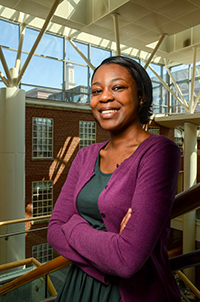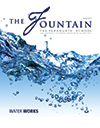
UNC Alumna's Training and Talent Help Her Communicate the Water Institute's Story

Enelda Butler
Enelda Butler never learned how to swim. She always wanted to learn, though, and she thinks working for the Water Institute just might motivate her to jump in.
After growing up in Tuscaloosa, Ala., Butler attended the University of Alabama for her undergraduate degree in public relations. Immediately following the completion of her bachelor's degree, she came to the University of North Carolina at Chapel Hill for her master's degree in Journalism and Mass Communication, with a focus on strategic communication.
While studying journalism at Carolina, she served as the assistant and then senior editor of The Fountain. Butler's experience at Carolina, she says, prepared her to balance multiple tasks at once and to break large projects into smaller parts. "I think graduate school made me a better storyteller," she says, "which is essential to my job."
After graduating with her master's degree in May 2012, Butler landed a position with the Water Institute at UNC as the Communications Support Associate. She is responsible for the branding and communications for the Institute.
The daughter of a minister and a teacher, Butler credits her parents' influence for her love of the university environment and passion to help people.
"I've been around universities my whole life," Butler says, "and now I am so grateful for the opportunity to work at one of the world's top research universities, leading communications for this incredible Water Institute."
The Water Institute, affiliated with the Gillings School of Global Public Health, addresses a need for academic leadership and research in the unprecedented water crisis that faces our world. An interdisciplinary approach enables the group to work toward solutions for critical global issues in water and health, such as access to proper sanitation and clean water. The Institute researches, educates and spreads information to policy makers, practitioners and the public.
The Water Institute also partners with other universities and organizations to increase the impact and effectiveness of water research.
"Water issues have a more extended reach than one might imagine," Butler says. "For example, girls in an African village who are in charge of fetching water can spend so much time on that chore that they don't have time for school." An issue fundamentally about sanitation can extend through numerous other facets of that culture.
Butler feels that every day she uses the training and education she received studying strategic communications at UNC-Chapel Hill to help further the initiatives of the Water Institute. "It feels good to use my talents to give back to Carolina," she says, "but even better to know, in my small way, I'm giving back globally."
♦ Cindy Austin


